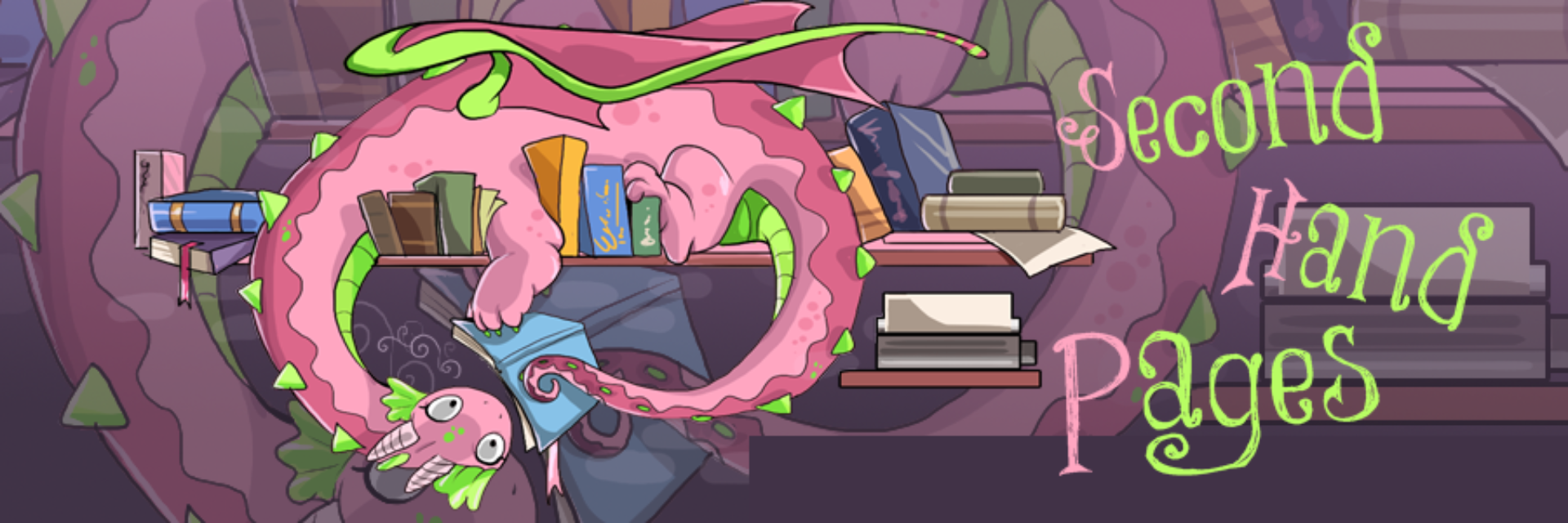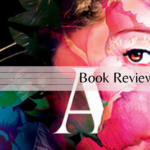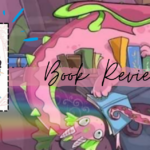“Kindness isn’t something you are.
It’s something you choose to be, every single moment of every single day.”
It’s a new year, and that means a new author! This month, I’m here to gush about A Curse of Roses and its author Diana Pinguicha.
Diana is the debut author of A Curse of Roses – a story about a princess starving because of her magic and the enchanted being that she frees in hopes of setting her free from the magic consuming her.
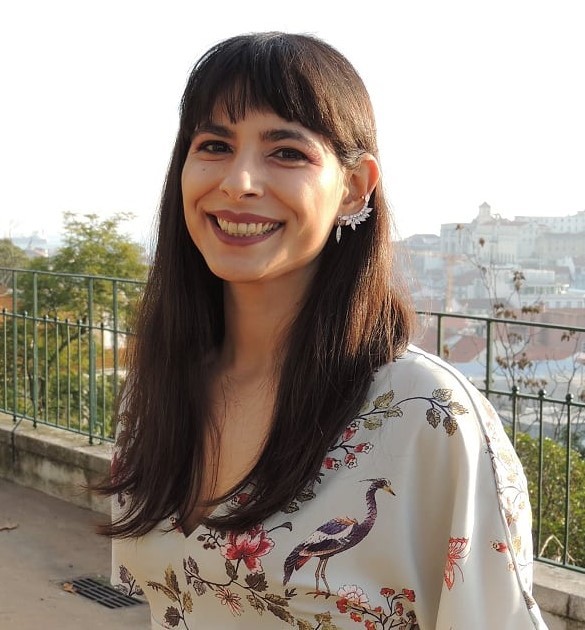
We all know that #ownvoices authors are my favorite. I love shouting my love for their stories from my rooftop as loud as I possibly can. Own Voice stories are incredibly important, not only in the queer community but as a whole. Making way for authentic voices not only changes the way readers perceive things, it changes the foundation of literature – allowing everyone a seat at the table. Pinguicha’s ability to weave legends of Saint Isabel de Aragão and fantastical magic into a story about accepting yourself is lush and cinematic.
Diana really delivers on character development and heartfelt angst. Her accuracy and detail in time period was a fascinating aspect that keeps the reader engaged and empathetic.
A Curse of Roses
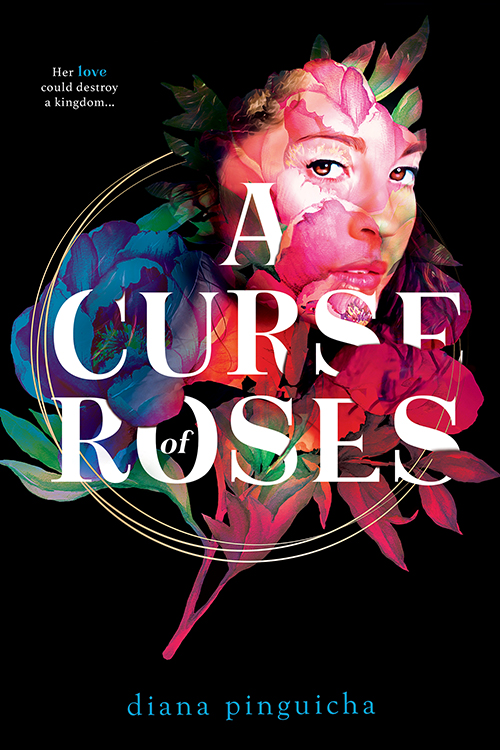
With just one touch, bread turns into roses. With just one bite,cheese turns into lilies.
There’s a famine plaguing the land, and Princess Yzabel is wasting food simply by trying to eat. Before she can even swallow, her magic—her curse—has turned her meal into a bouquet. She’s on the verge of starving, which only reminds her that the people of Portugal have been enduring the same pain.
If only it were possible to reverse her magic. Then she could turn flowers…into food.
Fatyan, a beautiful Enchanted Moura, is the only one who can help. But she is trapped by magical binds. She can teach Yzabel how to control her curse—if Yzabel sets her free with a kiss.
As the King of Portugal’s betrothed, Yzabel would be committing treason, but what good is a king if his country has starved to death?
With just one kiss, Fatyan is set free. And with just one kiss, Yzabel is yearning for more.
She’d sought out Fatyan to help her save the people. Now, loving her could mean Yzabel’s destruction.
Based on Portuguese legend, this #OwnVoices historical fantasy is an epic tale of mystery, magic, and making the impossible choice between love and duty…
For the full review, click here!
Author Interview
Both Yza and Faty are beautifully layered and flawed characters. They both possess the strength and love that so many of our protagonists lack at times. Which girl do you relate to more?
I relate to both Yza and Faty at different points, and they both have some of my traits, but overwhelmingly, I think I relate more to Fatyan! Yzabel is much too nice and super religious, whereas Faty is more blunt and independent, and lives by her own rules.
Yza’s self mutilation is a really hard topic that the novel addresses. Are these self-imposed injuries historically accurate, and how does this compound Yza’s self image?
It was historically accurate, and not something I was aware of until I actually went on a research dive for the novel. It made me so sad to learn this about her., but also left me unsurprised. There’s a very real connection between Medieval Saints and eating disorders, and as someone who had problems with disordered eating (and still does), it struck a chord in me. Religion, especially in the Middle Ages, was everything, and the interpretation back then wasn’t the healthiest. This includes the practices of fasting and self-mutilation in the name of God, and Yzabel, being raised in those overwhelmingly harmful values, would adhere to them because she was led to believe that was how you showed devotion. So I took it upon myself to deconstruct those behaviors so it’s shown to her that those behaviors weren’t good for anyone–especially since some Catholic sects still think that way. So a lot of Yzabel’s journey ended up being about detaching herself from the harmful interpretations of faith, and shedding her old beliefs to embrace new ones.
Related, Yza’s desire to be a good queen for her people outweighs her self preservation instincts. This results in some catastrophic events. The use of religion to explore her “Curse” is a commonly used trope, yet you managed to make it feel fresh and new. What message do you hope to relay to readers using this trope?
This is a really good question! The answer is two-fold, I think–first, I always been drawn to the duality of certain concepts. And a lot of the time growing up, I did feel like my existence was a curse because I kept hearing things along the lines of, “Why can’t you be normal?” and “Regular people don’t behave this way,” and stuff like that. I’d be criticized and bullied for things I can’t help–things that were actually harming no one. At the same time, the things that seemingly made me so different from those around me were also why my internet friends liked me. Maybe because they’re also overwhelmingly neurodivergent and queer, but with them, I learned to look at things differently.
Something others think to be a blessing may actually be a curse if seen from a different perspective. And I wanted Yzabel to go through that: what she thought to actually be a curse was actually a blessing, and all of it–good and bad, is what makes her, well… her. And I wanted readers to have that–to know that what you think is a curse might be a blessing if you look at it from a different perspective.
While Faty’s not completely honest with Yza during the course of the novel, their relationship is a much healthier relationship than many YA books portray. Why do you feel it’s important to portray relationships that are not built on toxic traits and romanticized abuse?
I grew up with a lot of art that glorified abusive and toxic relationships, and without realizing it, I internalized all of that. And then I got older, and realized that the things I thought were normal in relationships were, in fact, not that great. It also greatly annoys me when I read a book or watch a show or movie where all the misunderstandings could be cleared up by having a conversation.
Faty had her own secrets to keep, and she wasn’t fully honest with Yzabel in the beginning. I knew this would lead to problems down the line, and you don’t resolve those problems and misunderstandings unless you talk to people about them. So I wanted them to confront their wrongdoings and what had led them there, and how to work so they don’t happen again.
The magical system in this world is well built, lush and immersive. What is your favorite part of the magical system, and why? (I’d have to say that the beautiful death was hands down my favorite!!!)
Why, thank you! 😀 That was one of my favorite scenes to write, even though it broke my heart. But my absolutely favorite part to work on was how can magic be of use to a whole society, rather than to one single person. When I was first conceptualizing this, and the food-and-flowers aspect emerged, I knew that if someone like Yzabel could make unlimited food, she’d use it to help others. And since there are more like her, I also wanted to show a bit more of how those people could use their gifts to support those around them. So I guess what I’m saying is, my favorite part wasn’t in developing a magic system that’d be of use in a battle, but rather, for peace–even though, well, if push came to shove, I suppose it could be used in battle too!
The supporting characters in the novel are just as lush and vibrant as our main characters. How did you come about forming them? Do you have any processes that help you flesh out secondary characters?
It was an amalgamation of historical context, as well as what purpose I wanted them to serve in the story. Vasco was one of the three people who visited Isabel in Aragon and who vouched for her as a future Portuguese queen. It made sense to me that he’d become a sort of father figure to her after, so I wrote him like that. Brites is completely made up, but I wanted her to both be like Vasco in that she loves and supports Yzabel, but with a shorter fuse and little filter. Denis kept a lot of traits that are historically accurate (he was a philanderer, and he did write poetry) and I extrapolated his personality from those, as well as the things he did during his reign.
As for fleshing them out… before I start writing them, I always need to have a sense of who they are as people. What they want and don’t want, what they’ve been through, how they react to things–I have a notion of those things, even if they don’t end up on the page. For instance, Brites’s and Vasco’s personalities are still intact from draft one, but Brites’s role changed from a witch they sought out, to castle maid, to Yzabel’s lady’s maid. Her character was the same, only her occupation changed.
Fatyan’s conviction is something to admire. Her strength, willing to stay trapped until someone worthy came along, is a beacon of hope – and I really felt was a metaphor for giving your heart to someone who was truly capable of loving you wholly. What inspired Faty’s character?
She was originally inspired by the legend of the Moura Salúquia, who was engaged to marry the Alcalde Bráfama and supposedly threw herself from a tower when she realized the Portuguese had killed him in order to infiltrate Al-Manijah. I was extremely unhappy with the notion of killing yourself over a man–one of those toxic romantic notions, you know? And so I sort of rewrote the legend and had Faty choose to throw herself off that tower to keep people from using her, like her father had used her before several times. Which backfires, since they still had time to curse her to spend eternity in a stone. She’s, understandably, very angry about this, especially when people find her and want her to be someone she’s not. Rather than be free of the stone by becoming someone else, she holds onto the only thing she can: herself, and who she is.
Bottom line is, her inspiration was both legend and wish fulfillment, because we all want to live as we are, without compromising who we are.
In the same vein, Brites is a bold mother figure that loves selflessly. Will we get to see more of Brites? I would LOVE to see a sequel (or prequel) about her journey with the Enchanted Mouras!
The idea HAS been floated, believe it or not! But that would depend a lot on ACOR’s success, so I better not get too attached to it!
The relationship between the King and Yza develops into something very tender, even at it’s rough moments. What inspired the compassion that Denis displays?
Denis, in spite all of his flaws, was one of the best kings we had, and together with Yzabel, they were a great couple in general. However, he was always born to be king, and as such, he would exhibit a lot of entitlement and erroneous notions. And here comes this foreign girl who basically tells him no and stubbornly calls him out on his bad behaviors, something he’s never really experienced. They’re both hard-headed, and so they clash a lot, but ultimately, they both want the same: to make the country better.
He was actually rougher and much worse in earlier drafts, and softening him took around three passes. But ultimately, I wanted him to be problematic, but good at his core, because that’s what he was, historically.
Not really a question, but I have to squeal with delight that Iza has a pet in the novel. We do NOT see this enough, and the animal lover in me wants to hug you! LOL
YES!! ANIMAL PEOPLE UNITE! Yzabel’s way with animals came from a sub-legend about her, where she’d be sewing while singing to birds. One day, she dropped her thimble down the window, and the birds swooped down and brought it back to her. Upon reading this, I decided her first gift, the one that’s smaller, would have something to do with projecting emotions to living creatures. So I knew from that moment I’d want her to have an animal companion. At first, it was going to be an Iberian Lynx (which are presently very close to extinction), but I had to scratch that. At the same time, I discovered a lot of Portuguese breeds were also slowly disappearing, like the Cão de Castro Laboreiro and the Rafeiro do Alentejo (Alentejo Mastiff). I grew up around some amazing dogs, one of which was an Alentejo Mastiff named Migas, so I wanted to include one and remind people that they exist. And when I inevitably move to a farm, I will be getting my own Lucas!
What are your favorite craft books?
Save the Cat! I use its pacing and plotting method a lot and swear by it when it comes to story beats!
What advice would you give to anyone writing, but still struggling to break through?
I know everyone says the same thing, but truly, the trick is to never give up, because the moment you do, then there’s really no chance of anything ever happening. And if you’re stuck between books, ask yourself: what’s a story that’s unique to you? What can you tell the world that no one else can? Use that, as many times as it takes.
Should we be expecting more from you soon!?
I hope so! My problem isn’t actually the lack of ideas, but getting down and working on just one, especially when I have a day job and a part-time on top of it. So, fingers crossed!
